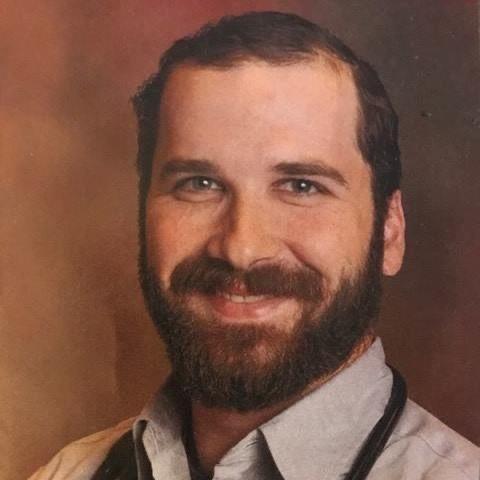Section Branding
Header Content
Local Doctor Describes His Trouble Getting Tested For COVID-19
Primary Content
Dr. Zachary Cohen says his first coronavirus symptom was a scratchy throat.
The 34-year-old double board-certified physician said he started feeling ill Friday, March 13. It was one day after health officials announced the first death in Georgia from COVID-19: a 67-year-old man succumbed at WellStar Kennestone Hospital five days after being diagnosed.
His throat wasn’t even sore, just scratchy.
“A little bit of a runny nose, some sneezing and a very mild cough,” Cohen said.
He figured, with the timing and increasing pollen count, he had allergies. As school districts around the state decided to close campuses, Cohen decided to use the weekend to monitor his symptoms.
Rather than risk getting patients sick, Cohen decided his respiratory symptoms meant he should stay home from work the following Monday.
His relatively mild symptoms turned into feeling winded walking down stairs, especially when holding his 22-month-old daughter. And he suffered paroxysms of coughing — meaning the doctor coughed so much a new cough started before the last finished. He described it as a chain-reaction.
“It's a little bit scary toward the end, when you start running out of oxygen and start getting lightheaded and wonder when the next breath is going to be,” he said. “That happened to me probably a dozen times over the course of my illness.”
His boss agreed Cohen should skip seeing patients at the clinic in Gainesville where he’d spent the previous two weeks tending to sick people without much protective gear.
“After all, we were still being told COVID-19 was a milder flu-like syndrome and will pass soon,” the doctor posted on Facebook. “We were told that it might not even affect our communities.”
As Cohen self-quarantined, he suffered head and body aches, and a fever that reached 102 degrees. His not-quite-2-year-old daughter also developed a fever.
She was fussy, coughed a lot and had a fever of 102.7 degrees, but Cohen’s toddler quickly turned a corner after 48 hours.
That same week, Gov. Brian Kemp authorized Adjutant Gen. Tom Carden — at the request of Georgia Emergency Management and Homeland Security Director Homer Bryson — to call up as many as 2,000 Georgia National Guard troops to state active duty to address novel coronavirus and COVID-19 across the state.
Cohen listened to the officials’ briefings and heard physicians and frontline workers took priority with limited testing.
Dr. Kathleen Toomey, the state’s public health commissioner, said she hoped by the end of that week health care workers would be able to test 100 people a day. That’s across a state with nearly 10.5 million residents.
Cohen wondered which patients received coronavirus tests.
“I was essentially looking for leadership like, OK, how are we as a country going to prioritize who gets tested? Is it just going to be the critically ill patients? Is it going to just be the E.R. and ICU workers or is it going to include primary care and community doctors like me?” Cohen asked himself. “So, I waited for that message.”
When he started making calls, Cohen called his primary doctor, who was with a local academic hospital system. A nurse line established to determine whether patients met testing criteria asked Cohen if he had chemotherapy or a bone marrow transplant in the last year and whether he was currently taking immunosuppressant drugs.
When he answered “No,” he got his answer as well.
“We're only testing our employed health care workers and our patients that have answered yes to one of those three questions,” the nurse told Cohen.
He then called private labs, queried friends in the medical community and talked with patients who had been tested.
“Then I called the CDC, who deferred me to the state health department,” he said. “I called the state health department and they deferred me back to my primary care doctor. So that completed the circle.”
Wednesday night, March 25, Cohen broke down and decided to tell his story via Facebook.
At that time, there were 1,387 confirmed cases of COVID-19 in more than half of Georgia’s 159 counties. Forty-seven people had died and about 6,200 tests had been performed by state and commercial labs. The state also began that evening reporting the number pf patients hospitalized across the state: 438.
The growing consensus is that only the seriously ill are being tested.
Another doctor read Cohen’s Facebook post and chose to share one of three test kits she had for her private practice. Cohen is still waiting on the results.
By Sunday, March 29, Cohen said he felt nearly 70% better. He coughed some when speaking by phone.
The 34-year-old doctor who plays hockey and enjoys his health said he is concerned thinking about what COVID-19 might do to someone with a history of respiratory problems such as asthma, COPD or cystic fibrosis.
“I think the most important piece of this story is that I'm a young, healthy person with no preexisting medical conditions,” Cohen said. “And I got pretty sick and there were a couple of scary moments there for me.”
Cohen believes we each have a responsibility to use social distancing to prevent a surge of sick patients in hospital emergency rooms and intensive care units.
“If we don't take it seriously, there's going to be too many sick people for the hospital beds, too many people in respiratory failure for ventilators and not enough time to develop a vaccine and to study medication regiments for this acute viral illness,” he said. “We have to flatten the curve.”


